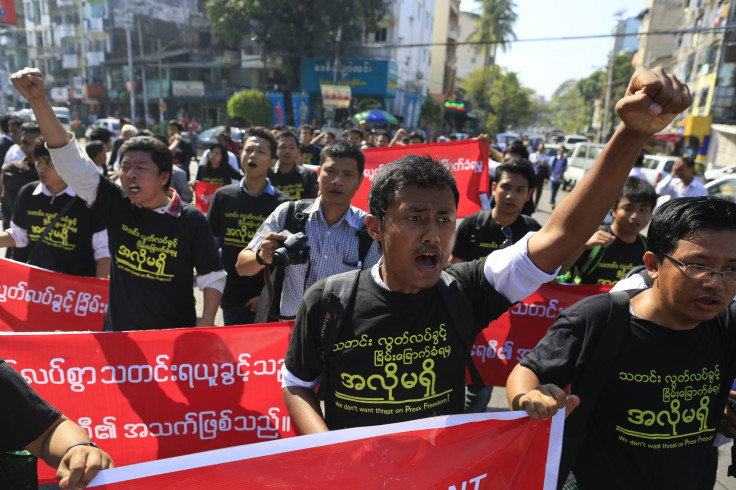Myanmar Journalists Given 10 Years Hard Labor Over Report On China's Links To Chemical Weapons Plant

A Myanmar court has sentenced four journalists and the CEO of a weekly newspaper to 10 years in prison with hard labor, after it published reports claiming the existence of a chemical weapons factory linked to China, the South China Morning Post, or SCMP, reported Thursday.
The five men were reportedly found guilty of leaking state secrets and the Pakokku District court handed down the sentence Thursday. Earlier this year, the Yangon-based Unity Journal published two reports claiming that a secret facility had been built in 2009 in tunnels near Pakokku, in central Myanmar's Magway region, to produce chemical weapons and that Chinese workers had been spotted at the site.
"This is a very big punishment for them," Robert Sann Aung, a lawyer for one of the five journalists said, according to SCMP. "I expected they'd be punished for trespassing and serve three months," he said, adding that the verdict came as a surprise, and that they would appeal the sentence. The five journalists had pleaded not guilty at the trial in March.
The five men were reportedly arrested in February, soon after the reports were published. One of the journalists, Tint San, told The Irrawaddy, a local newspaper, before he was arrested, that he had evidence to back up the reports' claims.
“I went to the factory myself. We have concrete evidence. I even left out some facts that might disclose state secrets,” he reportedly said, at the time. “I’m ready to face whatever happens in the future.”
The report, which was published in late January, said that the factory was visited by the Myanmar army’s former commander-in-chief, Gen. Than Shwe, in 2009; current Commander-in-Chief Min Aung Hlaing in 2011; and by former Vice President Tin Aung Myint Oo and current Vice President Nyan Htun in 2013, according to The Irrawaddy.
"The detention and trial of the Unity journalists is the clearest indication yet that military authorities are chafing under the more open reporting environment," Shawn Crispin, Southeast Asia representative for the Committee to Protect Journalists, had said according to Asia News, in March. "The conviction and sentencing to prison of the reporters would be the nail in the coffin of Myanmar's supposed media reform drive."
Myanmar enacted its first media law in March to ensure freedom of the press, bringing an end to an era of extreme media repression in the country.
© Copyright IBTimes 2024. All rights reserved.





















